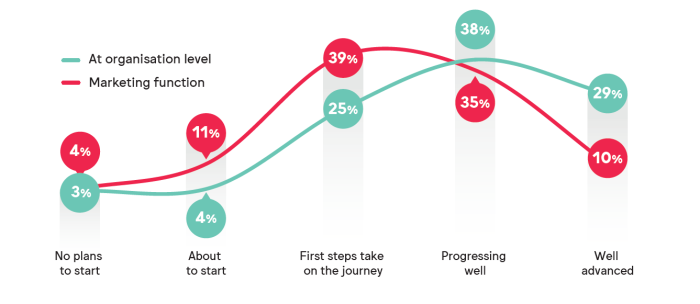Get comfortable with sustainability
The key insight from the WFA’s Marketing and Sustainability: Closing the Gaps research is that marketers need to get more comfortable with the topic. Scott Young from BVA Nudge Unit explains how that’s possible.
Share this post
I recently had the opportunity to work with the WFA and Project 17 on a landmark study, talking to more than 600 marketers across 34 countries about sustainability.
And right from the start, one message came across quite clearly: marketers simply aren’t all that comfortable talking about this issue.
This mirrors a key finding from the study, which identified a gap between organizations’ efforts on sustainability – and what their marketing teams are communicating. What’s particularly interesting is that more than two thirds of marketers felt that their company was “progressing well” or “well advanced” on its sustainability journey. Yet under 50% felt that way about their own marketing function. By their own admission, marketers are lagging their own organizations on sustainability.
The bottom line: marketers may have a good sustainability story to tell, but they aren’t quite ready to tell it.

What’s holding marketers back?
The issue doesn’t appear to be intent, as a vast majority of marketers agreed that brands have both an opportunity and a responsibility to make a difference in the sustainability journey. Further, more than 75% saw an opportunity to create competitive advantage in this area, through both innovation and consumer education.
Instead, our study points to several inter-related issues. First, there are clearly structural challenges within organizations. While many organizations now have a Chief Sustainability Officer, the vast majority do not report to the CMO nor the Marketing department. It’s not difficult to envision potential gaps in internal communication – and perhaps the implied message that sustainability is “someone else’s job”.
Second, lack of confidence plays a much larger role. Many feel that their marketing teams lack the technical knowledge to speak about such a complex issue. They also fear alienating people (or perhaps being accused of “greenwashing”) if they are outspoken on this sensitive topic.
Third – and the heart of the sustainability challenge – is a lack of definition. In fact, our study revealed (or perhaps reinforced) that sustainability means many different things around the world, with the primary challenges (and manifestations) varying by region; preventing deforestation in South America, reducing water usage in India and limiting pollution of air and water in China, for example.
Sustainability is also linked closely with human rights and gender equality in some regions, which opens a wider range of issues tied to working conditions and diversity/inclusion. In other words, there is no clear definition of sustainability. And while the UN Sustainable Development Goals provide a valuable roadmap, they do not clearly convey “what good looks like” for businesses.
In this context, it’s understandable that marketers are hesitant. To break through this barrier, education must be linked to definition – and ideally a common set of expectations, standards and KPIs that provide marketers and their organizations with needed clarity.
While this study highlighted many challenges, it also pointed to a promising path forward, tied to helping consumers live more sustainably. In our background research, we found clear evidence that many consumers want to change. In fact, there's a definite ‘intent to action’ gap, in which many consumers would like to act and live more sustainably, yet are not doing so. Moreover, they don’t perceive brands to be an ally in their efforts. This dynamic is a missed opportunity, both for the planet and for brand owners, and it means that there's an enormous “win-win” opportunity, if marketers can reorient their efforts and actively help consumers adopt new habits.
Some might be skeptical that marketers can “win” by promoting sustainable behaviours. First, I’d point out that sustainability does not need to involve reduced sales. Efforts could be focused on reuse or recycling – or perhaps selecting one product form over another. In fact, emphasizing behavior change provides an opportunity for companies to pro-actively “define” sustainability in a way that potentially aligns with their business model.
More importantly, behaviour change it is a way to bring sustainability to life in a tangible, visceral way – and to connect with consumers on an issue of increasing importance to them. Surely, people are likely to reward brands that help make them to solve their problems – and to feel better about themselves.
What needs to change?
Our study points to three ways that can work together to “close the gap” and help marketers become more pro-active and assertive on sustainability.
First, we need more education of marketers (and consumers): This should be tied to efforts to develop a common language and set of expectations/KPIs, which will help define progress and success – and help marketers to speak confidently.
Second, we need more inspiration and knowledge sharing: Marketers will also gain confidence by learning from others. And of course, these efforts and examples will also provide a form of social pressure, nudging them and their organizations to act and speak up.
Finally, we need to increase our efforts to help consumers live more sustainability. This is not only the right thing to do for our planet. It also provides a way for marketers to pro-actively define sustainability for consumers - and engage with them in a meaningful way.
Collectively, these efforts can help drive the “step change” needed to ensure that marketing leads the way to a more sustainable future. And I’m pleased to say that WFA is helping make this happen, beginning with its Planet Pledge.
The initiative is designed to put marketers in a position where they can help lead brands’ responses to climate change, encourage efforts across the wider marketing industry and help consumers act more sustainably when using their products and services. To find out more go to www.wfaplanetpledge.org





